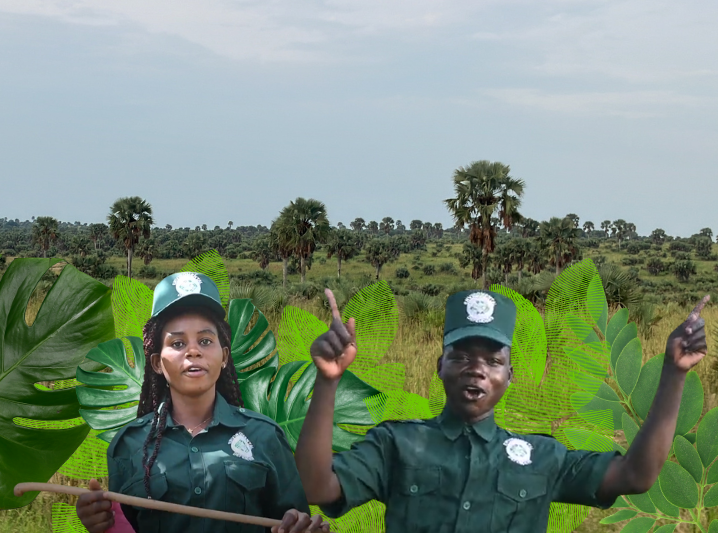Why there’s still hope for reversing degraded land in Uganda and the Democratic Republic of Congo — according to the people who make it happen
“The window of opportunity has not closed — we can still repair this land.” That’s according to Robert Agenonga, 33, who is a team member at Environmental Defenders — the World Land Trust partner and environmental justice organisation that protects the Albertine Rift region between Uganda and the Democratic Republic of the Congo (DRC).
The area is a priority for conservation because its swamps, savannah grasslands and scrub are home to more threatened and endemic vertebrates than anywhere else in Africa — African elephants, lions and giraffes, pangolins, the endangered Grey-Crowned Crane and several more Red Listed species of plants and birds. “I’ve seen a lot of changes compared to when I was a teenager, growing up,” he shares, describing alarming levels of degradation that he’s witnessed since his own adolescence. “Climate change exists,” he continues. “And we at the front line — we, the people who were born at the lake, who eat the food from the farms? We are already losing rainfall patterns. Field species have declined. Plants are disappearing. We are worried our children will not see them.”
This degradation is man-made. In Uganda, forest loss is largely driven by agriculture, fossil fuel extraction, and the timber market. Widespread practices such as bush burning, illegal logging, charcoal production, and cattle grazing continue to put intense pressure on the land. However, with the right resources, it can be brought back under control, and even reversed. To protect these threatened landscapes, World Land Trust has supported Environmental Defenders in establishing a vital wildlife corridor. This corridor connects key habitats between Murchison Falls National Park and East Madi Wildlife Reserve, allowing endangered species to move more freely in search of food, shelter, and safe breeding grounds.
The corridor protects species like the African Elephant (Loxodonta africana). Credit: Ondrej Prosicky/Shutterstock
The essential role of the ranger
But there’s more to protecting the land than only creating reserves. Because as Robert points out, the global mission to protect 30% of the world’s land and ocean areas by 2030, as laid out in the Kunming Montreal global biodiversity framework, is only feasible if that land is patrolled, safeguarded from threats. That’s why World Land Trust’s Keepers of the Wild programme funds the salaries of rangers on partner reserves, like Jerry Olokmu, 26, who works at the Nyamukino reserve, and Christine Amia, 28, who works in the Kaginga reserve.
Jerry’s route to becoming a ranger was perhaps unconventional. He explains that as a young boy he earned money from burning charcoal. The most-used cooking fuel in Uganda, charcoal is highly lucrative — sometimes even referred to as ‘black gold’. “I was doing it without anyone to advise me that what I was doing was bad for the environment,” he explains. “Then after some time, I realised.” Now, thanks to WLT’s Keepers of the Wild programme — which funds his salary as a ranger — he uses his deep knowledge of the land to protect it instead. “That’s why I chose to join the Environmental Defenders, and I’m so happy with the work.”
“Cattle keepers have the mentality that any bushy or forested land has no owner,” explains Robert. But thanks to the partnership with Environmental Defenders, he says that “when keepers enter, they now find a house well-equipped for rangers, and rangers patrolling the area regularly.” Jerry adds that many farmers come to respect the rangers once they understand their role in preserving the land. “Sometimes, when you explain why certain activities aren’t allowed, they don’t argue. They see that you’re protecting these areas.” To build allyship with local farmers, Jerry also supports them when wild animals — like elephants or lions — damage their crops from time to time. If a neighbour raises a complaint, Environmental Defenders will guide them to the Uganda Wildlife Authority, which can step in to help.
Wild encounters
While Jerry took an unexpected path into protecting nature, Christine, on the other hand, knew she wanted to be a ranger since she was just eight years old, after witnessing the murder of animals near where she grew up. “Due to bad situations, like poaching and war, the numbers of animals started decreasing — so I promised to do something.”
Now, twenty years later, Christine is responsible for protecting those very animals and their habitat. “We have challenges when people come from outside to destroy our animals, or cut down the trees. I feel very sad when this happens,” she recalls. “But my best moments are when I see everything is looking good. The animals are doing well, people are not cutting down trees, there is no bush burning — that’s when I’m happy.”
Christine has developed a deep connection to the animals she protects. Her favourite animals to encounter are monkeys “because they don’t have any problem with people!”. But she is also trained for worst-case scenarios — like escaping from life-threatening encounters with predators. “I have to look for all possible ways of escaping the lion if we encounter one.” Has she ever had to escape a lion? “Not yet,” she replies coolly.
Jerry, too, has learned how best to navigate close encounters on patrol. “When you meet elephants, it’s dangerous,” he explains. “But we try to avoid the paths they’re walking. You have to follow the wind, because otherwise they can smell you. So we move in the direction of the wind, not against it”.
But rangers must prepare for more than run-ins with the animals they protect. Robert is quick to highlight that the safety of Jerry and Christine — and, indeed, rangers around the world — should be a global priority and concern. “There is news of rangers being killed by poachers at gun point — they have not committed any crime. Only the ‘crime’ of defending the place, stopping criminals from accessing these resources.” He explains that ranger fatalities are increasingly across the globe, and that Africa is tragically taking the lead. He’s concerned that East Africa and the Congo Basin — particularly Uganda and the Democratic Republic of Congo — may be among the regions with the highest number of rangers killed in the line of duty.
“Rangers need to be protected physically,” Robert says. “They should sleep in a good house. They should have work equipment, telephones and lighting for the area where they are staying.” He adds that along with physical and financial security, rangers need psychological support to cope with stressful situations — like escaping threats to life from poachers, militia or animals in the wild.
World Ranger Day 2025
And while protecting rangers is the right thing to do — it’s also one of the most effective and efficient ways to protect the environment, in Robert’s opinion. “It is very expensive to plant trees — but it is very easy and cheap to allow forests to regenerate,” he explains. “We need to stop deforestation, but also to protect existing forest with rangers.” He explains how the same logic extends to protecting wildlife. “The cost of migrating wildlife species from one region to another region where they don’t exist is more expensive than allowing natural habitat to flourish, and letting species migrate naturally to this land undisturbed.”
But as Robert points out, that’s only possible when rangers have the tools, safety, and support they need to do their jobs. Funding from World Land Trust — along with global solidarity for its partners, like Environmental Defenders — is crucial for protecting rangers and, in turn, reversing environmental damage.
So far, that solidarity has led to real progress and hope. “Rangers are deployed to protect standing trees, and habitats are rejuvenating without any threats. Species are returning. Threats against the river are reducing, new species are being discovered, and organisations are improving their capacity to manage, to sustain and also communicate. The kind of work World Land Trust does can be seen directly on the ground. It is wonderful work,” Robert smiles.
“But protecting 30% of the globe is a collective responsibility,” he adds, as the conversation draws to a close. “Which means global solidarity is very important — on World Ranger Day, and every day.”
You can support Rangers like Jerry and Christine by donating to Keepers of the Wild.

